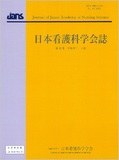Japanese
English
- 販売していません
- Abstract 文献概要
- 参考文献 Reference
要旨
目的:関節リウマチ患者の主観的症状(疼痛,倦怠感,朝のこわばり)に影響する心理・社会面を検討し,看護支援の示唆を得ることである.
方法:通院する関節リウマチ患者93名を対象に自記式質問紙調査を実施した.関節リウマチ患者の主観的症状を従属変数,心理・社会面を独立変数として重回帰分析を行った.
結果:関節リウマチ患者の主観的症状に影響していたのは,疼痛では主観的QOL尺度「志気」,倦怠感では主観的QOL尺度「志気」「受容」,コミュニティ意識尺度「連帯・積極性」「他者依頼」,朝のこわばりでは主観的QOL尺度「志気」「受容」,コミュニティ意識尺度「連帯・積極性」「他者依頼」,ユーモア態度尺度「攻撃的ユーモア」,日本語版LSNS-6であった.
結論:関節リウマチ患者の主観的症状には,特定の心理・社会面が影響することが明らかとなった.心理・社会面の支援は主観的症状を軽減する可能性がある.
Purpose: To examine the psychological and social factors that impact the subjective symptoms (pain, fatigue, morning stiffness) of rheumatoid arthritis patients and obtain suggestions for nursing support.
Methods: We conducted a self-administered questionnaire to 93 outpatients with rheumatoid arthritis. We conducted a multiple regression analysis with the dependent variable set as the subjective symptoms of rheumatoid arthritis patients, and the independent variable set as the psychological and social factors.
Results: The subjective symptoms of rheumatoid arthritis patients were affected by the following factors: for pain, subjective QOL scale of "morale"; for fatigue, subjective QOL scales of "morale" and "acceptance," and community awareness scales of "solidarity/aggressiveness" and "depending on others"; and for morning stiffness, subjective QOL scales of "morale" and "acceptance," community awareness scales of "solidarity/aggressiveness" and "depending on others," humor attitude scale of "aggressive humor," and Japanese-version LSNS-6 score.
Conclusion: Specific psychological and social factors affected the subjective symptoms of rheumatoid arthritis. Psychological and social support may reduce subjective symptoms.
Copyright © 2023, Japan Academy of Nursing Science. All rights reserved.


